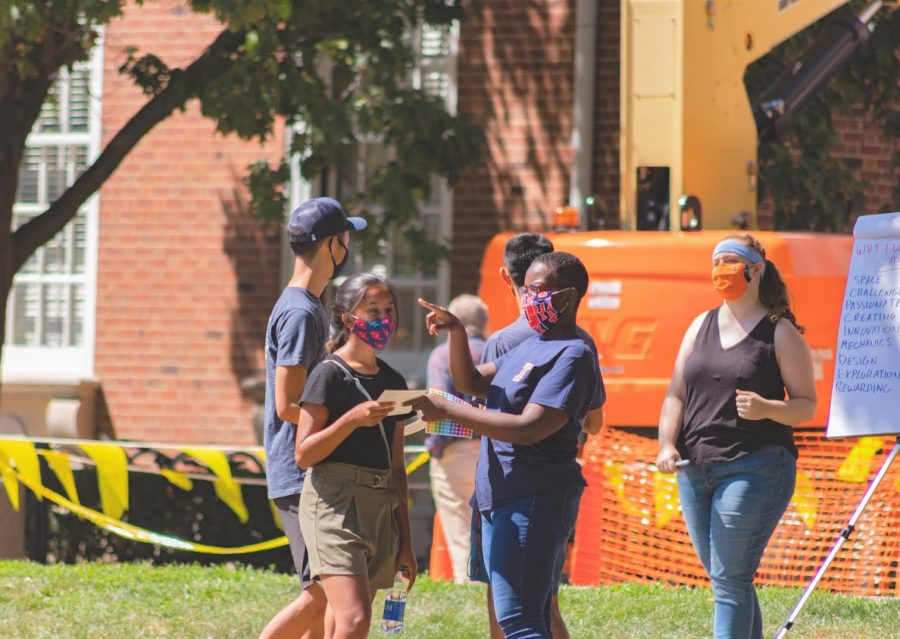Greek, private housing becomes center of campus spread
An Illinois employee hands a student a leaflet on the Main Quad on Aug. 21.
September 9, 2020
With one fraternity, Pi Kappa Phi, already suspended for hosting a social event well over the 10-person limit, fraternities and sororities have been the center of discussion of how to contain the spread on campus.
Last week, the University announced a two-week stay-at-home-order to be implemented and it was revealed that over 100 students were under investigation for violating COVID-19 guidelines.
On Sept. 2, public health experts met with University officials on Zoom to discuss the current state of COVID-19 and possible changes to be made following the recent spike in cases on campus.
“The majority of the clusters are within 10 to 15 dorms or Greek houses,” said Awais Vaid, deputy administrator of the Champaign-Urbana Public Health District. “There are dormitories, private certified housing and Greek houses that have more than 10% of their residents that are currently positive.”
He added that the majority of these gatherings are happening in indoor facilities, which cannot be monitored.
Get The Daily Illini in your inbox!
According to Nigel Goldenfeld, professor in Engineering at the University, bars in Campustown, such as Joe’s Brewery, have not been the leading source for COVID-19 cases and their attendance is currently less than 50% its usual.
Goldenfeld added that generalizations should not be made about Greek life, as not all individuals who belong to fraternities or sororities violate the guidelines.
According to Goldenfeld, approximately 30-40% of fraternities and certified housings on campus have no cases at all.
One solution the University and public health members have been considering is partnering up with fraternities and sororities as a form of community work.
According to Andreas Cangellaris, vice chancellor for academic affairs and provost, the University is trying to build an alliance and support group with fraternities and sororities. In addition, the University is trying to engage more with fraternities and sororities that have already had problems.
“We are engaging with fraternities and sororities, and I will tell you that a portion of the presidents of those fraternities that are behaving are becoming very proactive advocates of the importance of staying the course,” Cangellaris said. “Because at the end of the day, it matters to their houses as well to see other houses behaving.”
According to Vaid, after the initial move-in weekend, the majority of cluster outbreaks on campus were due to students choosing not to follow social distancing guidelines either by hosting or attending large parties.
Vaid said for students to start adhering by the COVID-19 regulations at the University, it will take widespread education and communication. He added that the law is in place for prevention of cases and there are consequences for not adhering to the law.
“I hope students understand that it is a privilege to be able to attend classes in-person during this current scenario,” Vaid said. “A lot of hard work and planning has been devoted to make this possible. If everyone assumes individual responsibility, then we all benefit. The actions of a few non-compliant individuals can affect a large number of compliant and conscientious students.”







